Baldwin makes campaign stop in Fort
- Home
- Baldwin makes campaign stop in Fort
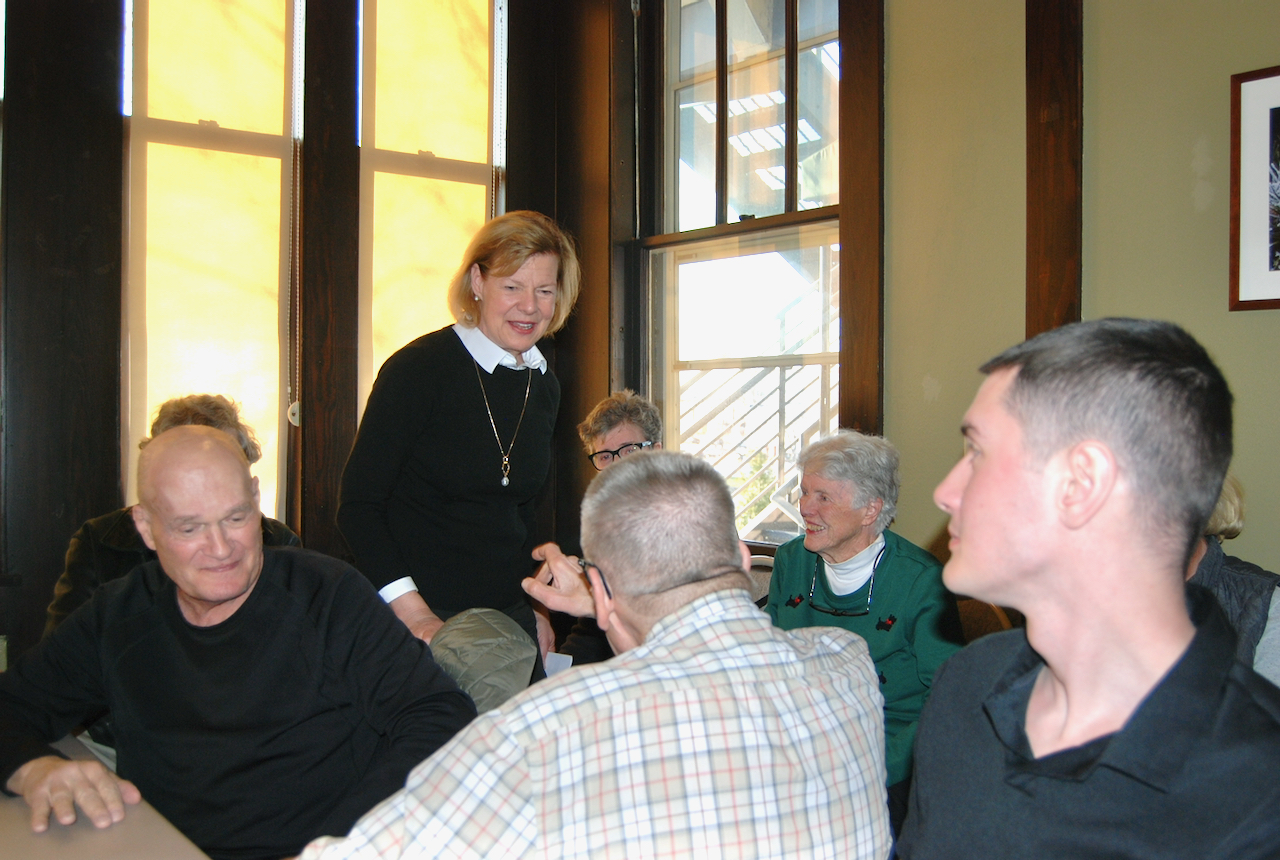
Baldwin makes campaign stop in Fort
By Kim McDarison
U.S. Sen. Tammy Baldwin, D-Wisconsin, on Wednesday brought her “Dairyland Tour” to Fort Atkinson.
The senator arrived at the Fort Atkinson Club community center where an eager crowd of some 80 people gathered to meet and greet her and hear her views about national issues facing the U.S. Senate, along with those characterizing her campaign platform.
Wisconsin’s incumbent junior senator will face Republican candidate Eric Hovde in a race to retain her seat this fall.
During her 30-minute speech, Baldwin spoke about several topics, including issues surrounding healthcare and insurance, costs of medications, “Buy America” policies and their relationship to job retention, citizens’ privacy, reproduction and marriage rights, and overall concerns about the future of democracy, among others.
At the podium and introducing Baldwin, Democratic Party of Jefferson County co-chair Kelli Rowley said that last year, Baldwin introduced bipartisan legislation “that holds ‘big pharma’ accountable (and) that three of the largest inhaler manufacturers will cap their prices at $35 a month.”
Additionally, she said: “Tammy knows that Wisconsin’s rural communities are the economic backbone of our state and she is working hard to protect our agricultural industries, and to make sure rural Wisconsinites’ voices are heard in Washington.
“In recently passed legislation, she secured critical funding for research in Wisconsin’s cranberry and dairy industries, and grants for dairy business innovation.”
Arriving at the podium and addressing constituents, Baldwin said she was on the last leg of her three-day Dairyland Tour, which she undertook during the Senate’s scheduled spring break.
Baldwin said that with this year’s mild winter, beginning her tour in Superior seemed like a good idea, but upon her arrival, the area was sustaining its worst snowstorm of the season and her meetings were “pulled down.”
Instead, she visited with the area’s snowplow drivers, whom she lauded as “first responders” during inclement weather.
“We brought them doughnuts. They had been on the road for literally, they’re allowed to be on the road for 16 hours, and they’re the first responders in this type of a situation. And we got there safely because of their work, and it was really great to start off our tour with a ‘thank you,’” she said.
Tour stops included a visit to the state’s north woods and the Fox Valley, she added.
Offering supporters her enthusiasm, Baldwin said she’s been asked, regarding the November election: “Can you win this?” and she offered her response: “Yes we can.”
A battleground state
Baldwin noted the importance of Wisconsin and its voters as a battleground state, saying: “It is not an exaggeration to say that who occupies the White House, which party controls the U.S. Senate, which party controls the House of Representatives, all of those questions could be decided right here in the state of Wisconsin.
“The stakes are high.”
She noted that the Republican Party also is aware of the importance of Wisconsin, citing its choice to hold its national convention in Milwaukee in July.
“They know what a pivotal state we are,” she said.
Baldwin talked about her opponent, saying: “It’s not a surprise that national Republicans spent months recruiting a candidate to run against me — a candidate who could self-fund, because he’s a multi-millionaire, and he did grow up in Wisconsin. He went to college, but, most of the first part of his career was spent in Washington D.C., where he ran a hedge fund, and then he came back to Wisconsin, bought a house, and ran for U.S. Senate in 2012. You may remember he came in second to Tommy Thompson (in that year’s primary election), and Eric Hovde, I think, was emboldened by coming so close to the former four-term governor of the state of Wisconsin who I then went on to defeat in that 2012 race.”
Describing Hovde, Baldwin said he started getting into the purchasing of banks and is the president and CEO of Sunwest Bank, and he has a residence in Laguna Beach, Calif. And, she said, “while he protests being described as a Californian, you have to have some presence there to be named one of the influential business people of Orange County three years in a row.”
Baldwin said the Republicans were “really pleased to get their top recruit, and no sooner had he declared his candidacy, he wrote a $3 million check to go up on television.”
The senator said she believed herself to be a target for the Republican Party because “I’ve never been afraid to stand up to the powerful interests, and you know what? Sometimes I win, and they know that.”
‘Fire in the belly’
Baldwin described her childhood circumstances as contributing factors to “the fire in the belly” which caused her to run for political office.
Baldwin said her mother was 19 and involved in a divorce when she was born. The pair moved into the home of Baldwin’s maternal grandparents. While her mother struggled with physical and mental illness, and, “from time to time,” Baldwin said, with addiction to the narcotics that she was prescribed by her physician for her various ailments, her grandparents provided a stable and loving home.
When she was 9, Baldwin noted, she developed a “very serious childhood illness similar to spinal meningitis.”
She spent three months in a hospital with her grandmother daily by her side.
Baldwin said she was not a legal dependent of her grandparents, which meant that their health insurance could not cover her. Her grandparents sought to find an individual insurance plan they could purchase for their granddaughter, to no avail.
Said Baldwin: “Back then, insurance companies could just say no. If you had diabetes, if you were a survivor of cancer, if you were, like me, a child with a preexisting condition, they were under no obligation to provide insurance coverage, and not at any price, you couldn’t find it, so I spent my youth without insurance. And fortunately after I recovered from my childhood illness, I was very healthy.”
Baldwin said the experience left her believing that “our healthcare system just was not right. And I watched my mother’s struggles, and I watched my grandparents’ worries, and I wanted to be a part of making a universal system where everyone had access to healthcare, that healthcare was a right, they had access to affordable, high-quality healthcare.”
Armed with that fire, she said, she began working towards her goals at the local and state levels, and then the constituents sent her to Washington.
“I got a chance to be on the committee that wrote the Affordable Care Act, and I was part of the effort that told health insurance companies, and they were powerful lobbies, they still are … but we told them that you cannot discriminate. You cannot discriminate against somebody because they had a preexisting condition, because they have diabetes, because they are HIV positive, you can no longer discriminate and you can’t discriminate in the premiums you charge. And that was a major breakthrough,” Baldwin said.
She said her amendment that was passed in the bill allowed children to stay on their parents’ plans until the age of 26.
Her statement received a round of applause from the audience.
“The day that we implemented the Affordable Care Act millions of young people, who had previously not had access to coverage, were covered. These are game-changers,” she said.
The Inflation Reduction Act
Baldwin next spoke about the Inflation Reduction Act, which she said was passed by the Biden administration “just a couple years ago.”
The legislation, Baldwin said, brought “huge breakthroughs in standing up to the big pharmaceutical companies.”
She described a process by which the pharmaceutical companies set the list prices of their drugs. In the United States, she said, “we pay far more here … than in any other country.”
She said prices were high in the U.S. because “we never negotiated with the big pharmaceutical companies for lower prices.”
With the Inflation Reduction Act, she said, “we have told Medicare, you need to start negotiating for lower prices. And the first 10 drugs that they are negotiating — they are in the process right now — these are drugs for cancer, for hypertension, these are drugs for diabetes, these are drugs that billions of Americans use for wellness and for their very lives.
“And often times we can’t afford them, and this is going to change it. It’s not just going to change it for the Medicare population, but as soon as there’s transparency, as soon as the big healthcare companies, insurance companies know what Medicare is paying, they are going to go in there saying: ‘We’re not going to pay any more than that.’ So this is going to filter down for everyone, and that’s so important.”
Additionally, she said, thanks to the Inflation Reduction Act, the cost of insulin for those on Medicare has gone down to no more than $35 per month, out of pocket.
“I know so many people with diabetes who pay hundreds of dollars per month and making choices between how high they turn on the heat in the winter or paying for their medication, making horrible choices, about whether to prioritize their rent or get a refill. We shouldn’t be in that situation. So we made this breakthrough with insulin and one of the insulin manufacturers, as a result of that, voluntarily lowered their prices for not just the people on Medicare, but for all of the people who purchase their product,” Baldwin said.
Similarly, she said, the list price in the United States for inhalers for people with asthma and COPD is between $250 and $650. In Europe, she noted, the price is between $7 and $50.
Baldwin said there are half a million Wisconsinites who have asthma.
She and her colleagues launched an investigation to learn why Americans were charged so much more.
Further, she said, there are only four manufacturers of inhalers. She and her colleagues wanted to know why there were not more competitors in the marketplace who could provide generic brand options.
Baldwin told her constituents that the investigation was launched “a few months ago,” and within a couple of weeks of the launch, one of the four major manufactures came forward and voluntarily lowered the price of an inhaler to no more than $35 per month, out of pocket.
“A couple months after that,” she said, “a second inhaler manufacturer came forward and said, ‘well we’re going to match that, we’re also going to lower our prices.’”
Baldwin said a third manufactures came forward to match the other two just as she was heading into a roundtable discussion in Milwaukee composed of individuals with asthma, doctors, pharmacists and even a school nurse, who, according to Baldwin, spoke about students in her care whose parents could not afford to provide the school with a backup inhaler.
“So now we have three out of the four companies that are voluntarily lowering their prices. I didn’t even have to pass a law to make that happen,” Baldwin said, adding that it happened because the investigation “put a spotlight” on the situation, creating transparency.
“This shows the power of what we can do when we stand up to these big, powerful corporations … and pull that curtain back; show what’s really happening,” Baldwin said.
Buy America
Baldwin next commented about issues revolving around jobs and multinational corporations.
“We have a lot of these companies that started here, that do incredible things — you could think of all the names of the iconic products that we make here — so some of those companies are 100, 150 years old, but if you’re multinational, and you make say widgets — whatever a widget is — because of that industrial policy and because of trade policies through the years, we’ve lost so many of our good-paying Wisconsin jobs to places overseas,” Baldwin said.
She offered a list of incentives that help multinationals make that choice, citing countries where such regulations as minimum wage, worker safety laws, and environmental protection laws don’t exist.
“You can emit whatever you want,” she said, “or if you have a choice to manufacture in a country say like China, where there are states, cities of forced labor or child labor, you could make your widget for a lot less money. You could increase your profits. And those incentives are too often built into the system.”
Said Baldwin: “I consider myself the champion in the United States Senate of ‘Buy America’ policies. What does that mean? Buy America policies are only talking about your own taxpayer dollars; we’re not talking to the private sector about where they can buy, how they source. But I want our taxpayer dollars for supporting U.S. jobs and U.S. soil businesses whenever possible, period. And so these big multinational corporations used to fight my efforts. I would try, and try, and try to get a Buy America policy embedded in another bill. And they would find it, and it might get a one year Buy America policy or sometimes a five-year Buy America policy. Well I want to tell you that in the Bipartisan Infrastructure Law, we have permanent Buy America policies. I fought for that.”
The audience applauded Baldwin’s statement.
She further mentioned the Chips and Science Act, where, she said, “we have permanent Buy America policies. In the Inflation Reduction Act — which I told you about the healthcare provision — but there’s also a lot of clean and renewable energy provisions, those have Buy America requirements. This is a game-changer.”
Extremists, rights and freedoms
Baldwin said her final thoughts would be about “standing up” to those whom she termed, “extremists,” defining them as the people who have been working for “so long, from behind the scenes, to take away our rights and freedoms.”
The folks she was describing, she said, had worked for years filing lawsuits, trying to pass state laws, filing federal lawsuits, trying to overturn Roe v. Wade.
Said Baldwin: “The folks that we’re seeing turn up in our local communities who are trying to ban books, rewrite curriculum to their own liking, it’s a serious thing right now.
“I always think of America as a place where we keep marching forward in expanding our rights and freedoms.”
With new legislations there can sometimes be “pushback,” she said, but, she added, “we had a steady march forward.
“And so everyone was so disturbed when we saw literally half of America have fewer rights than their parents and grandparents,” she noted, adding: “This is serious stuff.”
Baldwin, who is a lawyer, offered, what she described as “a summary,” saying: “Roe v. Wade was based on a right to privacy. It’s nobody else’s business, it’s our right to privacy. And the court basically said, there is no right to privacy because the word ‘privacy’ is not in the U.S. Constitution.
“Therefore, if you read it literally, there can be no right. So that was what they’re saying … that the court, back in 1973, got it wrong.”
Still, she said, Roe v. Wade was not the only case that was decided based on a right to privacy.
She cited a case called Loving v. Virginia, which, she said, validated interracial marriage, “or I should say, told states you couldn’t ban it or criminalize interracial marriage. That was in the late ‘60s.”
She additionally pointed to a case called Griswold v. Connecticut, which granted access to contraceptives.
Moreover, she said, a more recent case called Obergefell granted same-sex couples the right to marry.
“All of those cases that I just mentioned were based on a right to privacy,” Baldwin said.
She cited statements made by Justice Clarance Thomas, whom, she said, suggested that the U.S. Supreme Court might consider revisiting Griswold v. Connecticut, and, Lawrence, and Obergefell.
“He left out the interracial marriage caselaw, but he literally named those other cases, saying maybe this newly composed U.S. Supreme Court, where three justices came in during the Trump administration, maybe we would review these cases differently, just like we just did with Roe,” Baldwin said.
Baldwin said recent changes in caselaw and rights have left people “very frightened.”
She added: “They were frightened not only because of the result in Dobbs, but also frightened because they could see new rights and freedoms pulled away, stripped away. I spoke with many people in interracial marriages and same-sex marriages who are absolutely terrified that after all we’ve done to move forward, it could be all stripped away by the court overnight.”
Baldwin said the changing landscape motived her to join with her colleagues to introduce the Respect for Marriage Act.
“The way you should regard that is that it was an insurance policy that should a future Supreme Court reverse the Loving case or the Obergefell case, that legally entered into marriages would still be respected at the federal level by all 50 states.”
She said the bill had bipartisan support and was passed by all of the Senate’s 50 Democrats and 16 Republicans.
“President Biden signed it — It is now the law of the land,” Baldwin announced as members of the audience applauded.
“We can stand up to the extremists and we can win,” Baldwin said, adding that important work was still ahead, which, she said, was to “restore the rights lost in Dobbs.”
She noted that some 15 months after the court’s decision, in Wisconsin, “people had no service, no access to service, and I talked to somebody who had harrowing stories to tell of how they were not given health care when they desperately needed it.
“That can’t stand, and so I am proud to be the author of the Women’s Health Protection Act. That bill will do two major things: it would codify Roe v. Wade at the federal level, and then it would take the necessary additional step of telling states like Texas, and Florida, and Wisconsin that you cannot pass laws at the state level that refer the burden or encumber the rights,” Baldwin said. She added that while she does not yet have the 60 votes in the Senate required to pass the bill, she said: “I have a plan.”
Democracy on the ballot
Said Baldwin: “I tell you all of this because all of these issues are on the ballot this November. My opponent ran back in 2012, as I mentioned earlier … so, he’s on record with his position on most of the issues I just described. And we couldn’t be more polar opposite. At the time he ran in 2012, he said: ‘I am 100% opposed to abortion rights.’ He’s favored a national ban. On the Affordable Care Act, he’s on the record saying that he would repeal the Affordable Care Act in its entirety.
“He would strip away affordable health insurance from millions of Americans.”
Baldwin said that her opponent has said, regarding social security and Medicare, that he would raise the retirement age.
“He wants to cut back the benefits; benefits that you paid into in order to be able to receive at the end of a life of hard work,” Baldwin said.
Regarding tax issues, she said, her opponent favors lowering taxes for people in his income bracket and raising taxes on working people.
“Our very democracy is on the ballot. We know we almost lost it on January 6. We know there’s still people out there who deny the results of our last election. I’m going to fight to make sure your voice and your vote is always respected,” Baldwin said.
Questions from reporters
Following the program, Baldwin mingled with constituents and briefly met with three reporters, each of whom was offered an opportunity to ask one question. They were as follow:
Q: A Wisconsin Public Television reporter asked: What issues are you hearing about during this year’s campaign?
Baldwin: The high cost of things is continuing to be a very strong concern. People read the headlines that inflation has gone down, and then they go to the grocery store and look at the tab, and say, ‘that doesn’t look like it’s gone down.’ And there’s a lot of corporate practices that we are seeing right now, like, buy the Dawn dish detergent and they’ll have less in it than they used to, buy the bag of chips and there’ll be two ounces fewer chips. We are calling that ‘shrink-flation’ in many ways, but … it’s burdensome on families. And then you heard me talk about the high cost of medications for people who need life-saving medication — things for their wellness, things to reduce hypertension, or asthma inhalers, etc. I’m pleased with the progress we’re making on that, but we need to make sure we deliver for families that are feeling squeezed by the high cost. There’s many other issues that I’m hearing about — I’m hearing about concerns about the southern border, which I share. We need a secure and orderly southern border. We need to do a better job of interdicting drugs like fentanyl, that come, and we see far too many accidental overdoses here in the state of Wisconsin. It’s a tragedy, and we need to do more, and, in the Senate, I was so pleased that we put together a very strong bipartisan bill, but, unfortunately, they, through politics, that bill was tanked. And there’s some on the Republican side who would rather see chaos, and keep it as a campaign issue, than move forward and get the job done. I think we need to move forward and get the job done, secure our border, stop the illegal drugs, and it’s something that a lot of Wisconsinites are concerned about.
Q: A Fort Atkinson Online reporter asked: Locally, it really has been very focused on what we are calling a migrant or newcomers population, and while there was a lot of discussion when Ron Johnson came to Whitewater not too long ago about what was happening actually on the border, the folks in the area are more concerned about how they get some local resources, and your name came up more than once in interviews where we were discussing how those local resources might be brought back. Could you speak to that?
Baldwin: Absolutely. So in the very bill I was just talking about, I was able to get a provision that allows smaller communities to also be able to access the federal funding that’s available to help communities that are seeing migrants. When the police chief wrote to me, he talked about a need for translators, he talked about the need for more services as people were in the Whitewater area. And there was a concern that some of these larger programs were only sending resources to large cities, like Chicago or New York, but small communities that were seeing an influx did not get the support. So I wrote a provision to make sure that we have equitable distribution of these sort of funds. Also, the border bill that I’m talking about would have another impact: right now, when people come here seeking asylum, it can take years for their cases to be processed. If we had a system, like our bill would require, where it would be months, we wouldn’t have the same sort of flow of immigrants, and migrants, throughout the country because their cases would be resolved. They would either be given asylum, and we’d have an orderly process, or they would be denied asylum and sent home.
Q: A television reporter asked the senator about a shooting death recently committed in neighboring Michigan, with the reporter noting that a suspect in the case has been identified by local police as an individual who entered the U.S. illegally.
Baldwin: Unfortunately, the Republicans who played politics with our very strong border legislation — (I) want to reiterate: that was bipartisan legislation that we put together in order to restore order to the southern border as well as really increase the vigilance against illegal narcotics, like fentanyl, which is killing thousands of Wisconsinites. In the year 2020, 1,400 Wisconsinites died of fentanyl overdoses and those numbers are not improving right now. It is the leading cause of death of young people between 18 and 49 right now. When we talk about the tragic loss of life, we do need to pass this bipartisan border bill. We worked very hard and over weeks to put it together, and it was Republicans who tanked it essentially. Donald Trump said he preferred to have this as an issue during the campaign rather than pass a strong bipartisan bill to fix it.
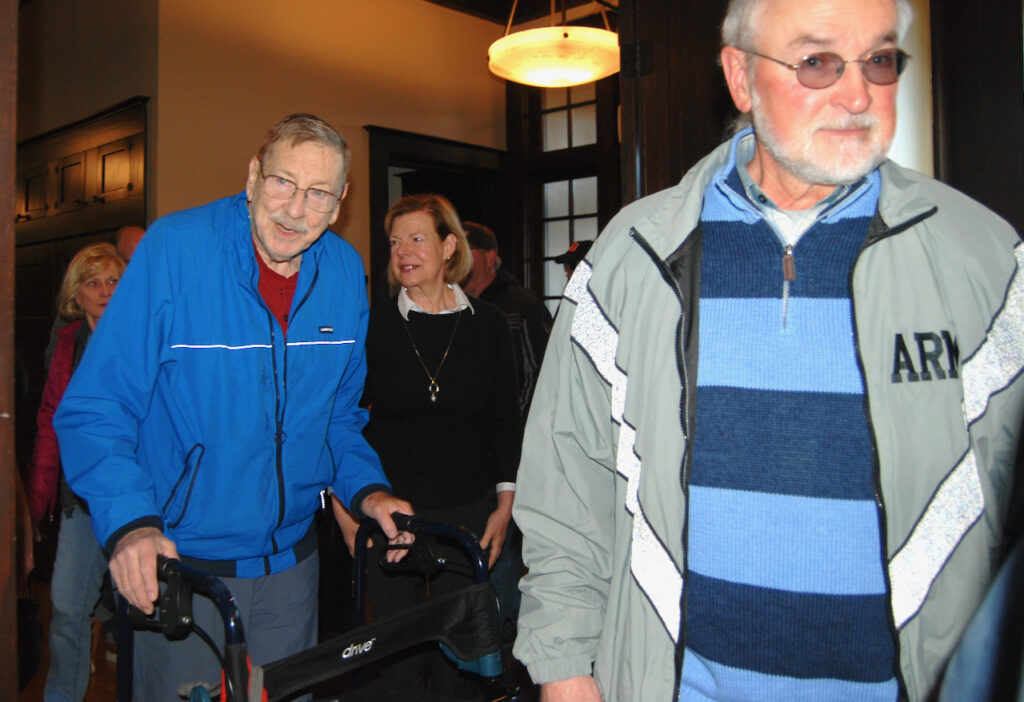
Along with her constituents, U.S. Sen. Tammy Baldwin, at center, files into the Fort Atkinson Club Community Center Wednesday.
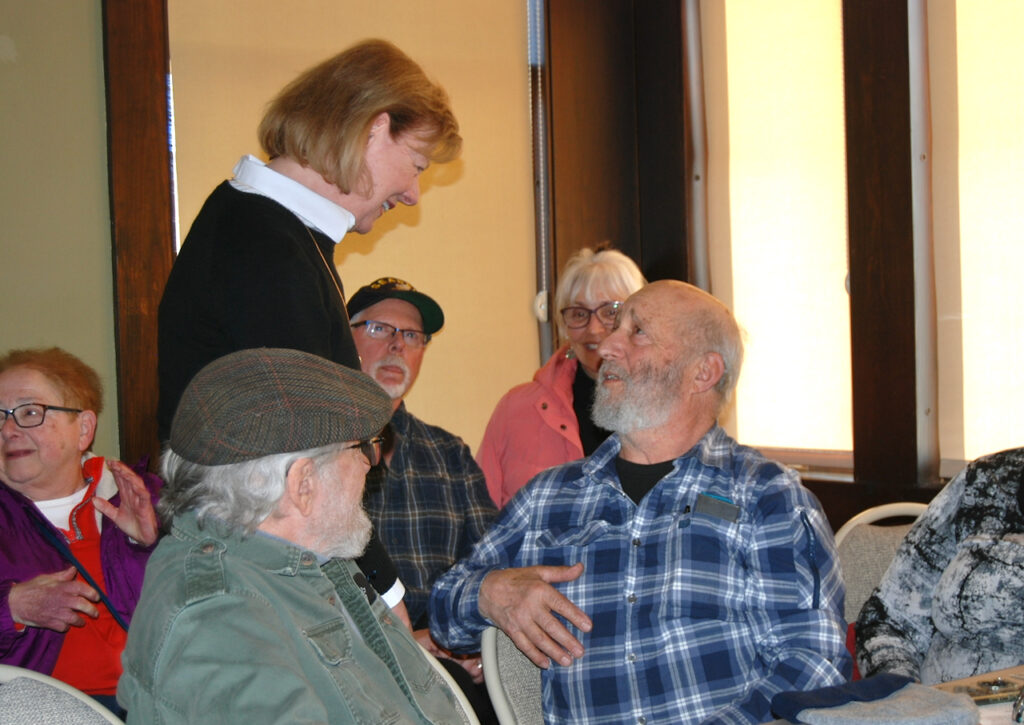
U.S. Sen. Tammy Baldwin, standing, visits with a constituent during a campaign stop made in Fort Atkinson Wednesday.
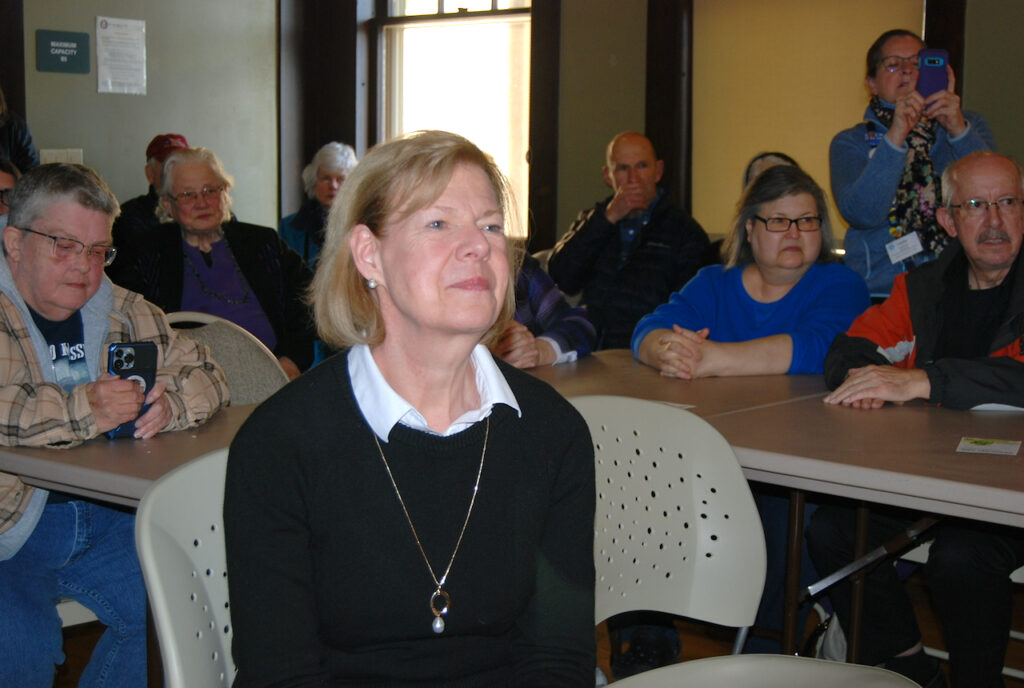
U.S. Sen. Tammy Baldwin listens as Democratic Party of Jefferson County co-chair Kelli Rowley offers opening remarks in advance of inviting the senator to the podium.
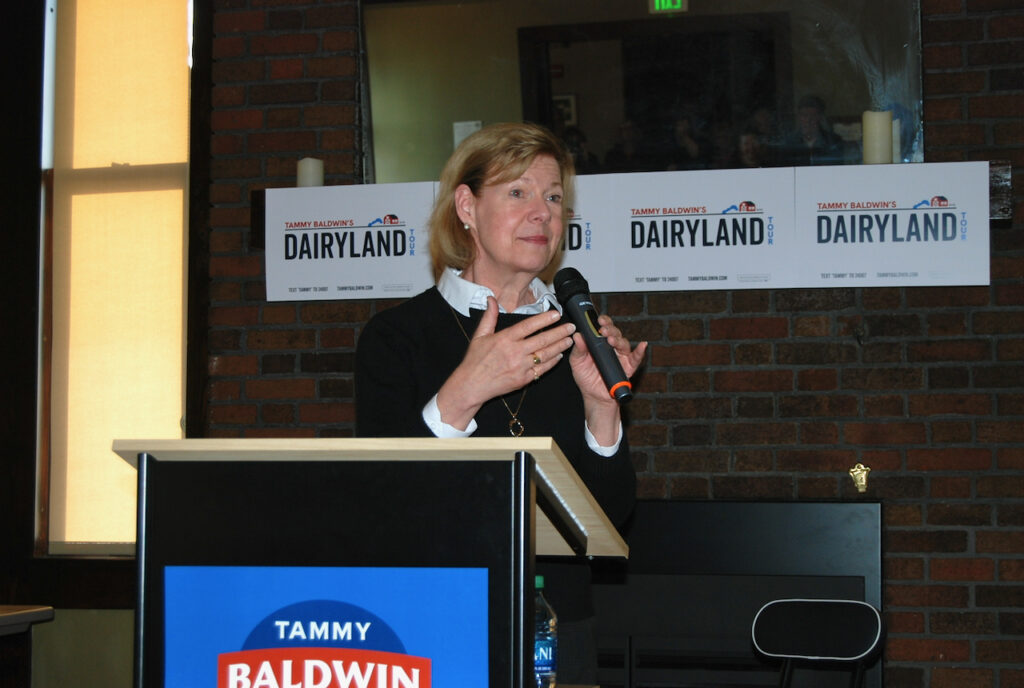
At the podium, U.S. Sen. Tammy Baldwin addresses some 80 constituents, offering her thoughts about such topics as healthcare availability and insurance costs, costs of medications, “Buy America” policies and their relationship to job retention, citizens’ privacy, reproduction and marriage rights, and overall concerns about the future of democracy, among others.
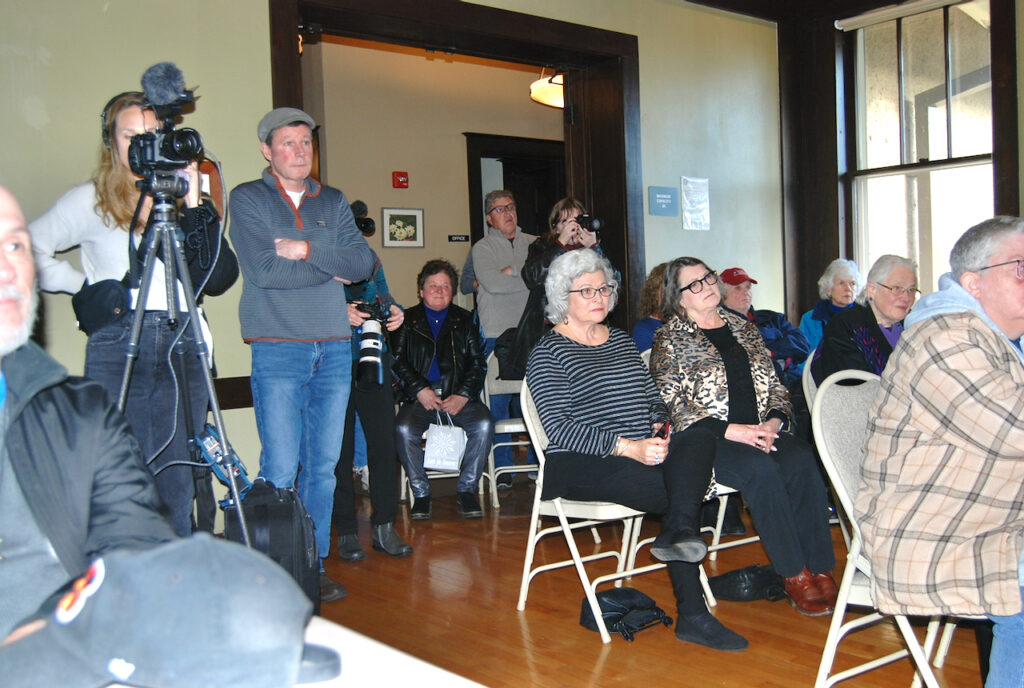
Constituents and members of the media fill the room at the Fort Atkinson Club community center where U.S. Sen. Tammy Baldwin delivered her thoughts. The senator was finishing a three-day campaign tour, dubbed “Tammy’s Dairyland Tour.” Baldwin’s name will be among those found on the November ballot.
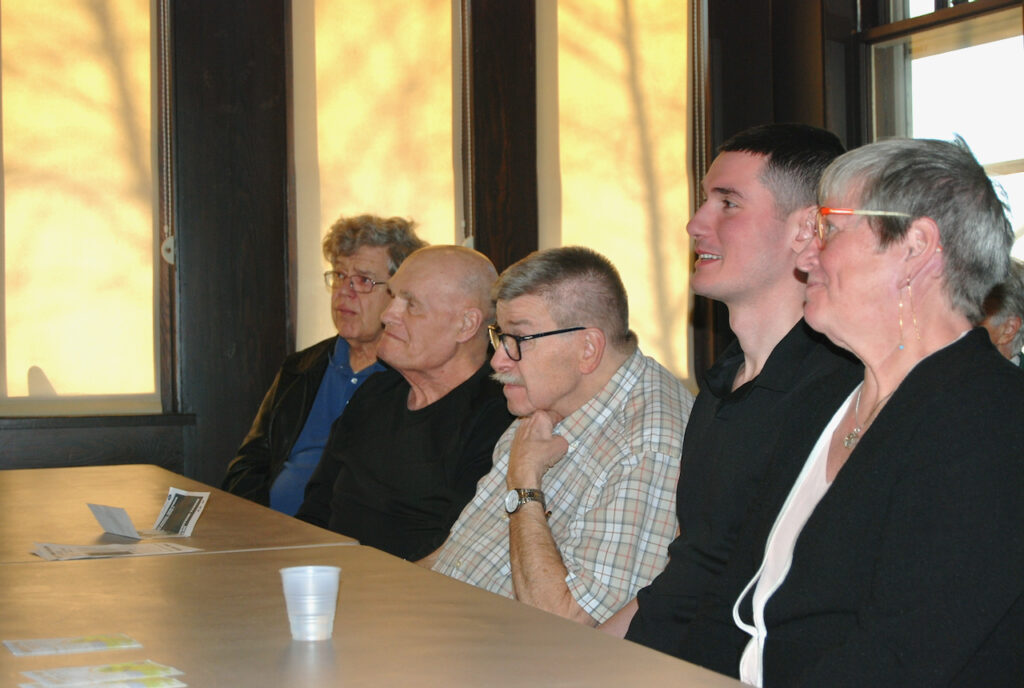
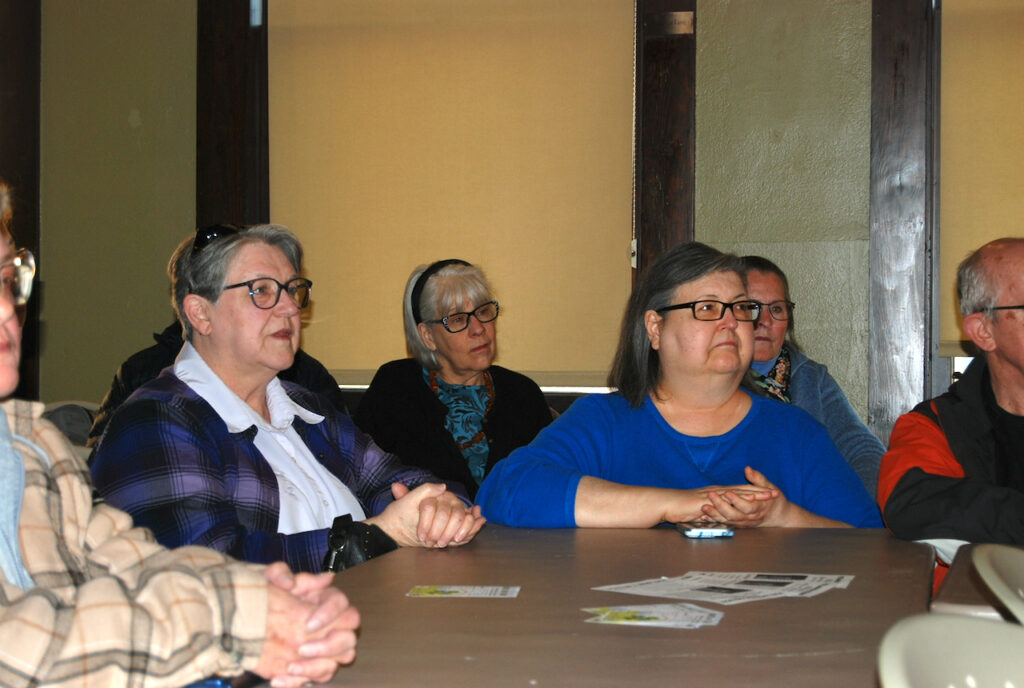
Two photos above: Constituents listen to U.S. Sen. Tammy Baldwin’s address.
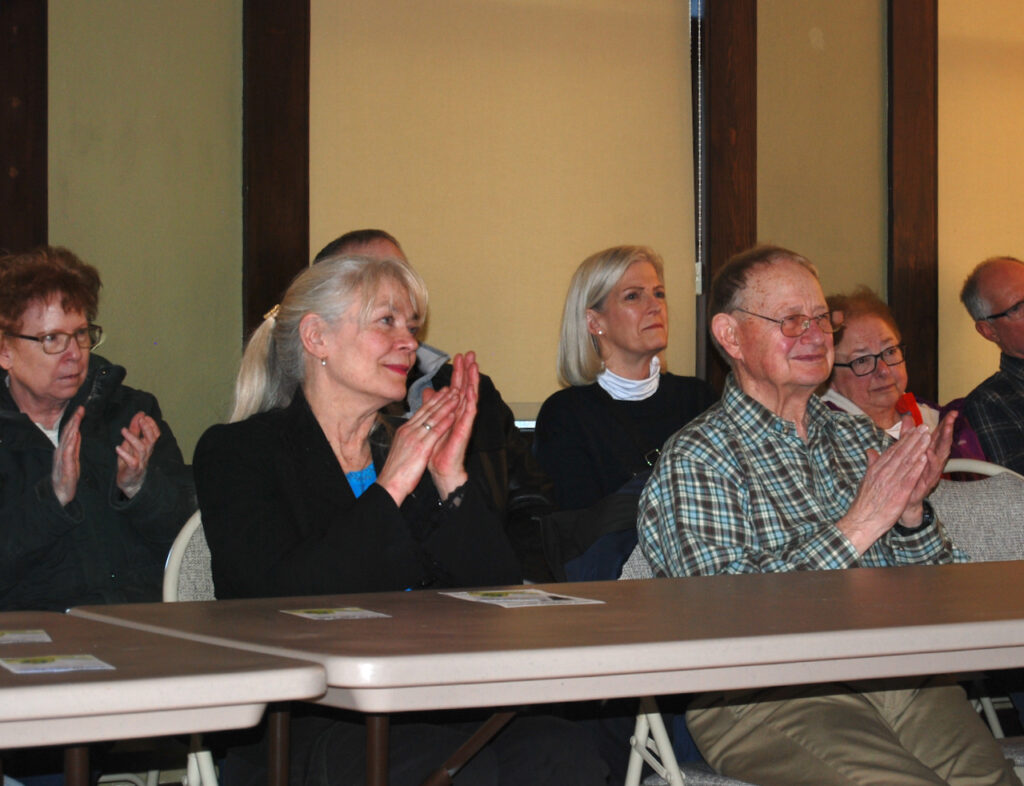
Constituents applaud remarks made by U.S. Sen. Tammy Baldwin.
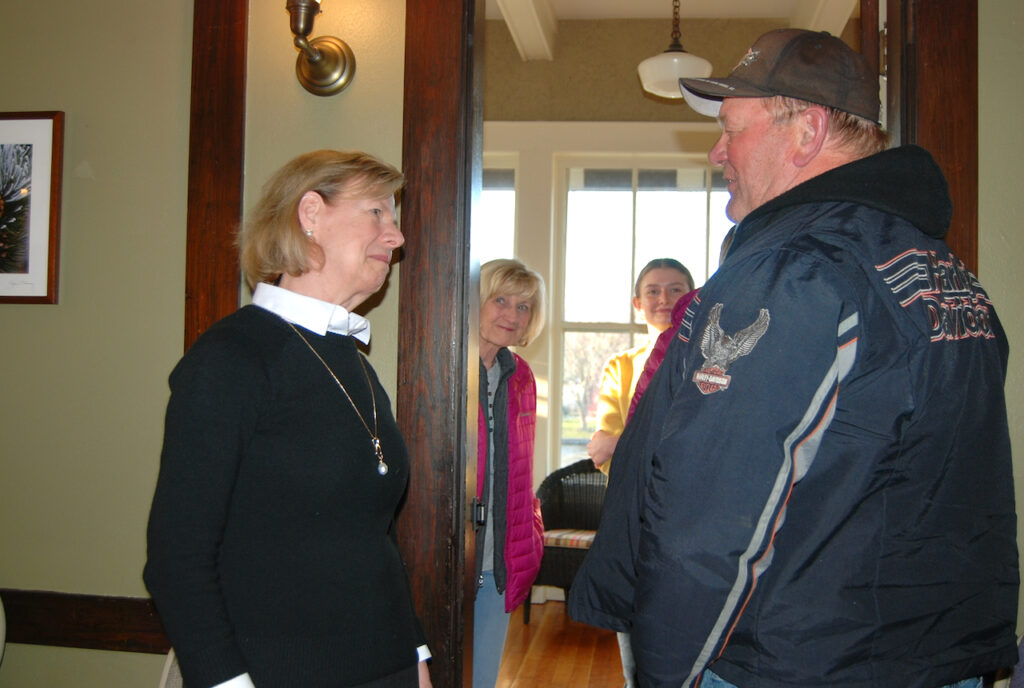
U.S. Sen. Tammy Baldwin, at left, following a 30-minute campaign speech, visits with a constituent.
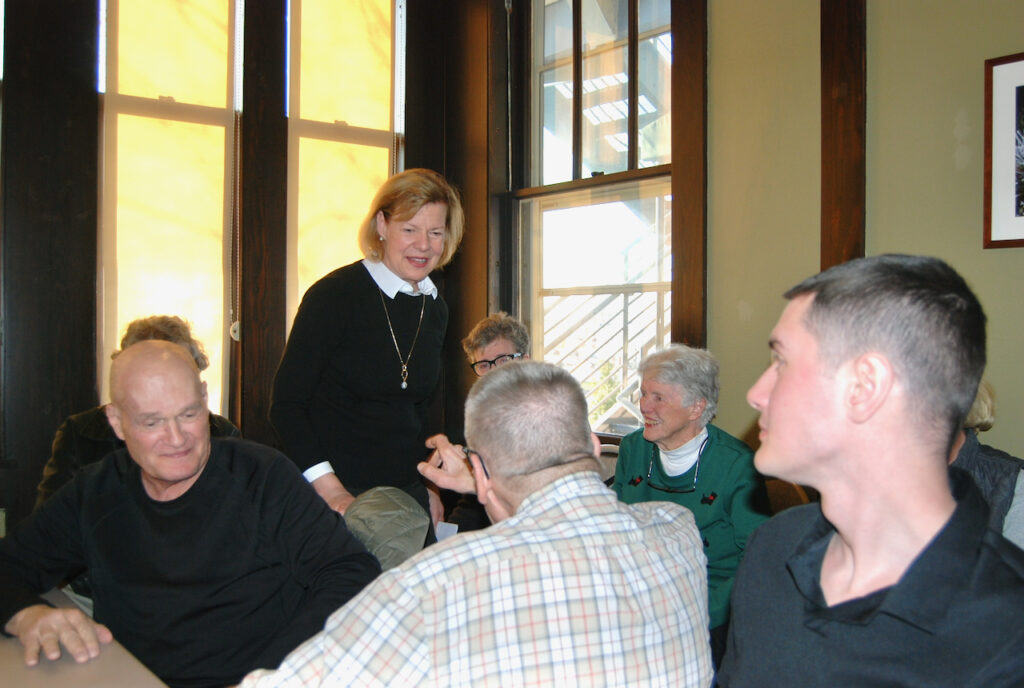
U.S. Sen. Tammy Baldwin, D-Wisconsin, greets constituents Wednesday evening at the Fort Atkinson Club, Fort Atkinson. At least 80 constituents filled the room to meet the senator and listen to her speak. The senator made her Fort Atkinson campaign stop on the final day of her three-day “Tammy’s Dairyland Tour,” according to information released by her campaign. Baldwin is running for reelection in November.
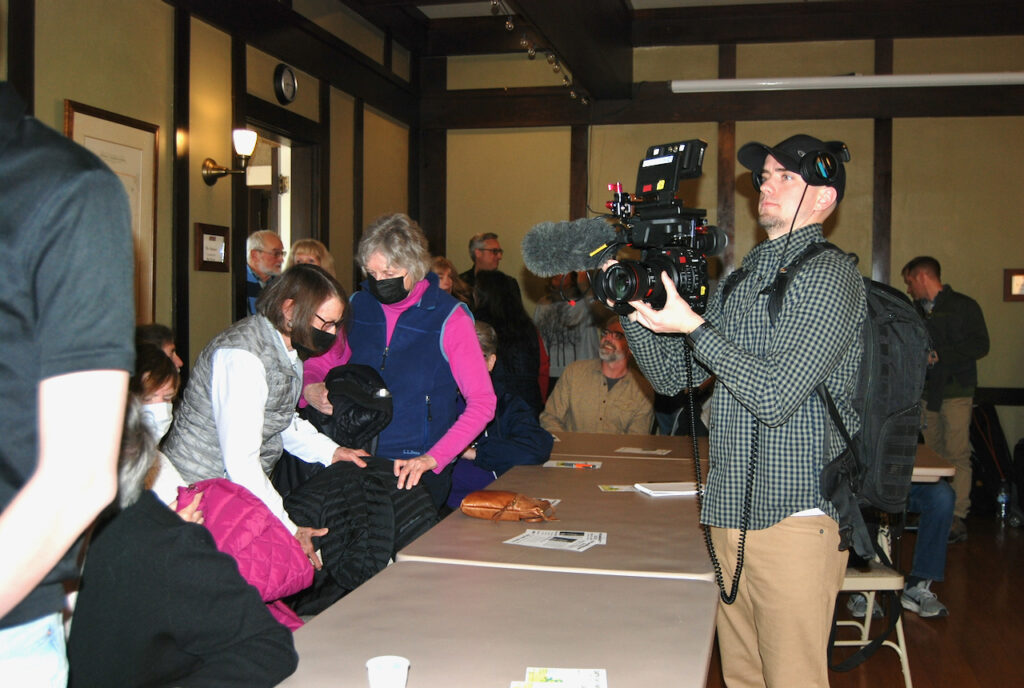
Nate Denzin, a cameraman with PBS, captures images of U.S. Sen. Tammy Baldwin as she visits with constituents.
Kim McDarison photos.
This post has already been read 1042 times!
Kim
Our Advertisers
Most Read Posts
- No results available